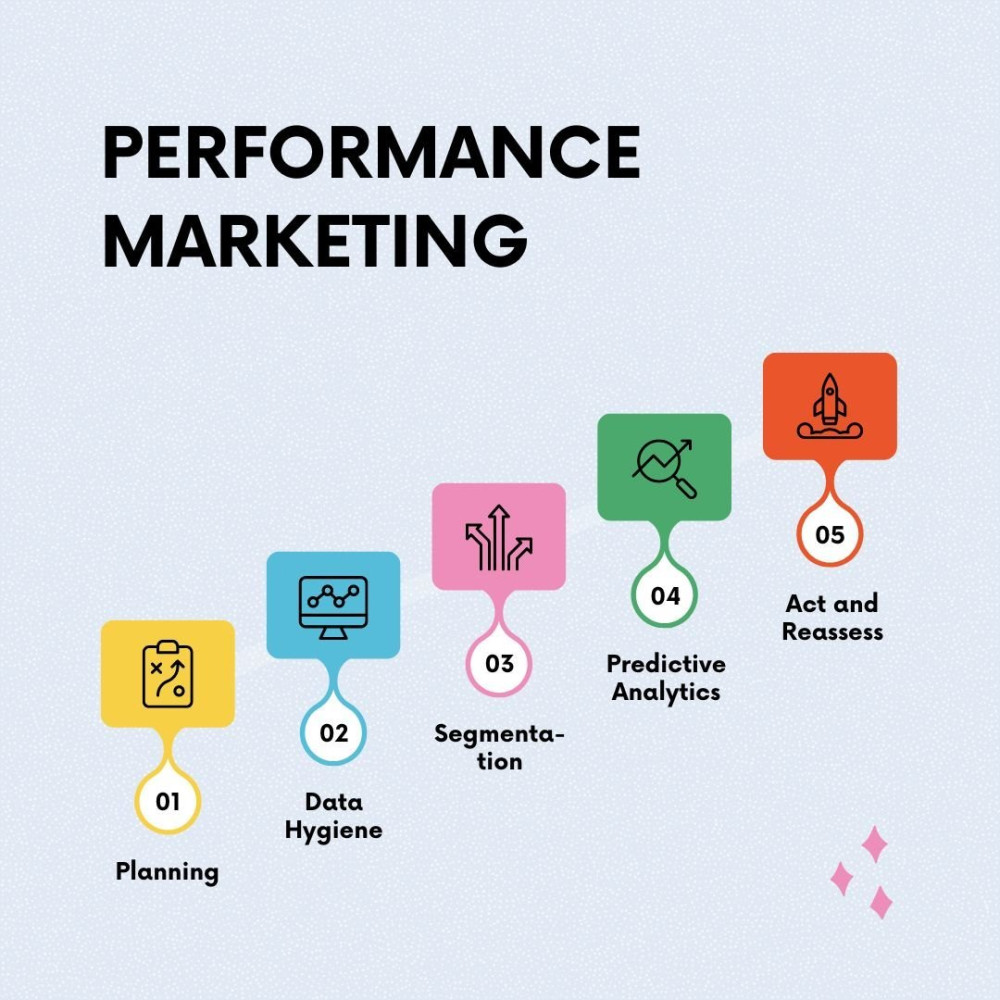What is Performance Marketing? Your Guide to Results-Driven Digital Marketing
In today's digital world, businesses of all sizes are vying for attention online. But how do you cut through the noise and reach your target audience with campaigns that deliver real results? Enter performance marketing, a results-oriented approach to digital marketing that focuses on measurable actions.
How Performance Marketing Works
Performance marketing works on a simple principle: you only pay for the specific actions you define as success. These actions, known as Key Performance Indicators (KPIs), can vary depending on your goals. Here are some common KPIs used in performance marketing:
- Cost Per Click (CPC):
The amount you pay each time someone clicks on your ad. - Cost Per Impression (CPM):
The amount you pay each time your ad is displayed, regardless of clicks. - Cost Per Sales (CPS):
The amount you pay for each sale generated through your marketing efforts. - Cost Per Leads (CPL):
The amount you pay for each qualified lead captured, such as a sign-up or contact form submission. - Cost Per Acquisition (CPA):
A broader term encompassing the cost of acquiring a new customer, which can include various actions like a sale or a download.
By focusing on these KPIs, performance marketing allows you to track the effectiveness of your campaigns in real-time and optimize them for better results.
Top Performance Marketing Channels
Performance marketing can be implemented through various online channels, each offering unique advantages. Here's a look at some of the most popular:
- Banner (Display) Ads:
Eye-catching visuals placed on websites and apps, driving traffic to your landing page. - Native Advertising:
Content that seamlessly blends into the surrounding platform, offering a less intrusive user experience. - Content Marketing:
Creating valuable and informative content that attracts and engages your target audience. - Social Media:
Utilizing platforms like Facebook, Instagram, and Twitter to connect with potential customers and promote your brand. - Search Engine Marketing (SEM):
A combination of strategies to improve your website's ranking in search engine results pages (SERPs), including pay-per-click (PPC) advertising and search engine optimization (SEO).
Benefits of Performance Marketing
Performance marketing offers a compelling set of advantages for businesses:
- Measurable Results:
Track the effectiveness of your campaigns in real-time and see exactly how your budget is translating into actions like website visits, leads, and sales. - Focus on ROI:
Allocate your marketing budget strategically, only paying for the specific results you desire. - Targeted Audience:
Reach the right people at the right time by leveraging data and targeting options on various channels. - Flexibility & Scalability:
Easily adjust and optimize your campaigns based on performance data, allowing you to adapt to changing market conditions and audience preferences. - Data-Driven Decision Making:
Gain valuable insights into customer behavior and preferences, informing broader marketing strategies beyond performance marketing initiatives.
Performance Marketing Examples
Now let's see how performance marketing can be put into action:
Pay-Per-Click (PPC) Advertising:
Bid on keywords relevant to your business and pay only when someone clicks on your ad, driving targeted traffic to your website.Affiliate Marketing:
Partner with website owners (affiliates) who promote your products or services on their platforms. You pay them a commission for each sale generated through their affiliate link.Email Marketing:
Building an email list and sending targeted campaigns to nurture leads and drive sales.Search Engine Optimization (SEO):
Optimizing your website content and structure to rank higher in organic search results, attracting potential customers searching for relevant keywords.Social Media Advertising:
Running targeted ads on social media platforms based on demographics, interests, and behavior, reaching a highly specific audience.Influencer Marketing:
Partnering with social media personalities who resonate with your target audience to promote your brand or product.Display Advertising:
Placing banner ads across various websites to generate brand awareness and website traffic.
Performance marketing offers a powerful toolbox for businesses looking to maximize their marketing budget and achieve measurable results. By understanding the different KPIs, channels, and campaign types, you can develop a data-driven strategy that delivers a strong return on investment (ROI).
FAQs About Performance Marketing
Q: What is performance-based marketing?
A: Performance-based marketing is a digital marketing strategy where you pay for measurable results, such as website clicks, leads, or sales.
Q: Is performance-based marketing a scam?
A: No, performance-based marketing is a legitimate and widely used marketing strategy. However, it's important to choose reputable partners and clearly define your goals and KPIs to avoid any misunderstandings.


